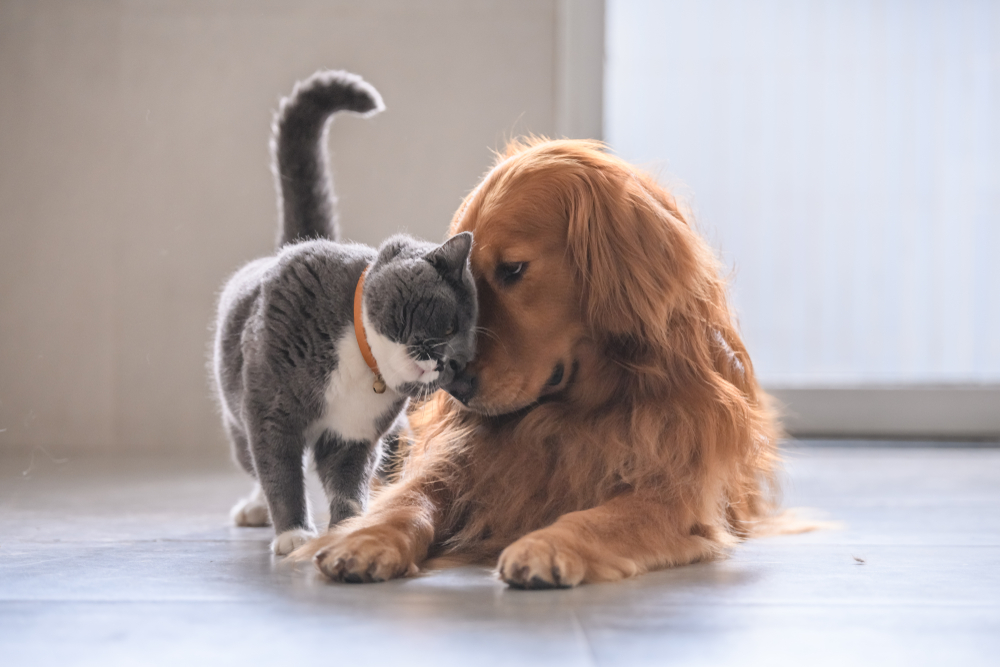
It has been a widely known phenomenon that some dogs love to chase cats! When they do, the unfortunate part about them is that they can easily hurt them, which makes their reputation very muddy. If you think that all dogs hate cats, however, nothing could be further from the truth!
In fact, many more dogs love cats rather than dislike them, ut their prey drive makes society think they hate cats. In this article, we’ll explore the temperament and purpose of different breeds so you can understand how their prey drive works and how it can affect their relationship with felines.


Dogs Don’t Hate Cats
The first thing to mention is that dogs do not hate cats. Some dogs simply have a higher prey drive than others. Cats are, for the most part, smaller, faster, and more of a challenge to dogs.
We all know that dogs are ready to play when you bounce a ball around or get them excited about any fast movement. However, if you have cats in the home, it could give your dog more of a challenge to try to catch the cat, even if they don’t intend to hurt them, thanks to their prey drive and instincts.
So even though it might seem like your dog wants to bite a cat in half, it’s often just that predator instinct rising in their systems that makes them want to chase smaller animals. While this can result in an injury, it is often avoidable if a dog is raised alongside cats.




Dogs Have Varying Prey Drives
A dog’s prey drive greatly depends on the breed and overall temperament. Some dog breeds are completely geared towards having a high prey drive because their intention or purpose is hunting.
Other dogs who are built for guarding might have protective instincts over certain types of animals. And then there are the couch potato lazy daisies that seem to love or be unbothered by just about any critter that walks around.
Breeds with Higher Prey Drive Potential


Certain breeds are notorious for having a very high prey drive. Several types of hunting and sport breeds are designed to stalk, find, and even snatch up prey for hunters. It isn’t their fault, it’s simple in their nature.
Any cat lover should be aware of these breeds if you plan to bring a pooch into the home.
Keep in mind that every single dog will be different. You might have one of these breeds that absolutely loves cats, and even some that are terrified of them! Cats are fine with holding their own in certain situations, so if your dog knows who’s boss is early on, they will likely not mess with your cats.
Of course, this shouldn’t be overlooked in any way. If your dog shows any instinct to chase or shows aggression towards cats, offer proper training and a watchful eye.


Why Socialization Is Important
Socialization is vital from a very early age. As soon as you bring your puppy home, it is important to acclimate them to all kinds of faces, both furry and human alike. The more they are exposed to cats and other types of animals, the more likely they are to be accepting of them as they grow up.
That is not necessarily the case in every scenario. Some dogs just have too intensive a prey drive to ever really be trained to love cats. You even have certain dogs that have been raised with cats and eventually are not compatible with them.
While it isn’t as common, it is certainly something to consider. Keep in mind that it is extremely challenging to have cats and dogs coexist with one another if the dog has a very intense prey drive.
Not only can they seriously injure them just by being playful, but they can kill a cat with one good shake, especially a large dog. So, no matter what kind of temperament your dog has, supervision is always advised when dogs and cats are in the same living space.




Why Cat Testing Is Crucial Before Adoption
If you already have cats in your home and you plan on adopting a dog, cats testing is non-negotiable. Some shelters request you to bring your pets in for a meet and greet while others do home visits.
Other shelters have cat-tested their dogs so they can tell if they have any prey drive instincts. If a shelter has not done this, it is not advisable to bring any dog home, no matter how docile they might seem.
Unfortunately, with shelter animals, you don’t always know the whole back story, and temperament can be hard to decipher when they are in that type of setting. Once they are comfortable, certain instincts might come out that would cause them to chase or even accidentally hurt a cat if they are not closely supervised.


Remember, Many Dogs Love Cats
Cats are pretty good at asserting dominance. Your dog is much more likely to be scared of or run away from your cat, knowing that they’re the ones that rule the roost. Eventually, many dogs and cats end up being very good friends.
Some cuddly kitties even love snuggling up with dogs in their beds to have a snooze. Dogs and cats can have very rewarding, fulfilling relationships with one another and it can also make some pretty awesome Kodak moments for your social media pages.
As long as dogs and cats are introduced properly and supervised efficiently, it generally tends to work out quite well.


Conclusion
So, now you understand that dogs don’t hate cats by nature. There is so much more that goes into it. Despite all the things you see about dogs and cats having a long-standing rivalry, in many cases, they can be cordial—and even friends!
If you already have cats and you plan to adopt any dog, ensure that proper cat testing has been done. The last thing you want to do is bring home a new dog only to lose your cat that same day. If you do your due diligence, everything should work out fine—just be proactive!
Featured Image Credit: Chendongshan, Shutterstock



